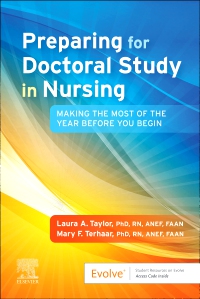
May 28th 2023
Laura A. Taylor, PhD, RN, and Mary F. Terhaar, PhD, RN, are the authors of Preparing for Doctoral Study in Nursing: Making the Most of Year Before You Begin, a resource that warmly invites readers to open the door towards graduate nursing education and explores a range of possible futures for doctorally-prepared nurses. This book results from more than a decade of Taylor and Terhaar living in the world of graduate and doctoral nursing education.
Taylor and Terhaar build this resource on an overarching model of Knowledge/Coaching/Resources: A decision architecture model/approach to pursuing doctoral education.

This book serves as a guide-on-the-side, coaching future applicants through skill development, activation of networks, decision-making, and finding the voice that enables each reader to put their best self forward in service of the profession and the health of the community.
In this book, Taylor and Terhaar:
- Present information and resources to build the reader’s knowledge to inform critical decisions.
- Incorporate a strength-based self-assessment approach to dispel the self-doubt of imposter syndrome and showcase each individual’s authentic strengths throughout the application process.
- Invite the reader to seek this stretch goal and, in so doing, contribute to nursing practice, education, research, and marching the profession toward greater diversity, equity, and inclusivity.
- Provide a cluster of Resources to support visioning, goal setting, and time management. In addition to the numerous useful text and web-based resources, they highlight the importance of networking with colleagues, nurse leaders, educators, clinicians, and researchers.
In this Q&A, Laura Taylor and Mary Terhaar share their thoughts on the landscape of doctoral education in nursing and the necessary insights and overall spirit of our nursing community needed to encourage, direct, and support future doctorally-prepared nursing workforces.
At a glance
Q: How does this book address the many challenges Nursing faces as the profession addresses the call by the American Association of Colleges of Nursing (AACN), the Institute of Medicine (IOM), Robert Wood Johnson Foundation (RWJF): The Future of Nursing for nursing to practice at the highest level of education?
A: The IOM/RWJF has set ambitious goals for the profession. Nursing is charged to prepare a larger percentage of its members at the doctoral level in order to bring elevated knowledge and skill to bear on the healthcare needs of society. Current nursing leaders are responsible for preparing nurse clinicians, educators, informaticians, leaders, scientists, and policymakers at the doctoral level to promote nurse-led science and discovery, advance the application of evidence to improve outcomes, and educate the next generation of nurses.
Helping early-career nurses understand the full range of options available to them, make informed decisions about the path that best supports their career goals, discern their readiness for doctoral education, and prepare to begin a demanding academic program can increase the number of nurses with terminal degrees, satisfy the goals of the IOM Future of Nursing report, and create a healthier future for all people across the US. Sharing strategies to overcome barriers to doctoral education has the potential to accelerate progress towards earning a terminal degree, sharpen focus on career goals that will enhance the experience of earning a nursing doctorate, reduce delay to completion, and help nurses navigate the challenges that can derail success in doctoral education.
Q: How will doctoral nursing advance health care for our future communities and the world?
A: Developments in health promotion, growing rates of chronic conditions, new and reemergent infectious diseases, and an aging society beg solutions nurses can provide. Increasingly called upon to lead in health care, industry, public health, administration, education, research, policy, advocacy, and other areas, the nurse workforce must be prepared to meet a broad range of challenges that arise from the complexities of the systems in which care is provided and the brisk pace at which science and therapeutics advance.
Doctoral education positions nurses to contribute fully to the team science and interdisciplinary collaboration necessary to meet these challenges, improve outcomes, lead systems and communities, advance science, transform care, innovate, collaborate, influence, and inform. These are the contributions for which doctoral education prepares nurses for now and for the future — locally, nationally, and globally.
Q: Why did you encourage doctoral nurses to share their stories?
A: The many options for doctoral nursing education support a range of exciting and diverse career paths. At the same time, the options can be confusing, which may impede entry to graduate school, may lead to a selection of a program that does not align with an individual’s career goals, may lead to frustration in the education process, and may ultimately lead to failure to complete a program of study despite significant investment of time and resources. Our goal in presenting these narratives is to reduce the confusion, expand the vision of possible futures for early-career nurses, and provide real-life stories that describe many diverse paths and careers for doctorally-prepared nurses. It was particularly important to us to feature accomplished nurses who look like the future to which the profession aspires.
We are pleased to be able to showcase actively practicing doctorally-prepared nurses from service, academia, and industry who have generously shared their journeys as a way to help readers see the bridges between early clinical expertise and careers in advanced practice and scientific discovery. We hope each reader will hear and see themselves in the voices and experiences of those who have shared their journeys.
Q: How is this tool book/companion workbook different from other books?
A: This book brings a uniquely bright and welcoming message to the early-career nursing workforce. Realistically assessing one’s readiness for doctoral education without support can be difficult. This workbook invites readers to reflect on the strengths, weaknesses, opportunities, and threats that attend their doctoral application. This self-assessment offers evidence-based resources and strategies that guide and inform the development of personalized plans to prepare and implement for the doctoral journey.
Q: How does this book support nurses in their ability to build a strategic and successful approach to the world of doctoral education
A: Earning a doctoral degree dramatically expands the career possibilities and potential impact for early-career nurses. Simply put, our intention is to level the playing field of healthcare delivery and innovation to create strength and diversity in all presentations. Just as the practice environment and challenges faced by today’s nurses were unimaginable to nurses trained in the 60s, the future and the challenges it will bring are beyond our imagining today. Increasing the doctorally-prepared nursing workforce is the best, most reliable way to prepare for those challenges and promote the health of our communities and our nation.
Although the healthcare challenges on the horizon may not be evident now, the challenges of earning a doctorate are known, based on the experiences of those who have been successful and those for whom success was more elusive. Our text tackles each challenge individually, presents evidence and strategies to address each, offers narratives that personalize the experiences with such challenges, and provides tools that can be used by the reader as they address these foreseeable challenges.
Q: This book offers numerous online tools and resources for nurses to build and use as they approach doctoral education. Tell us more about these resources.
A: Nurses pursuing doctoral education must critically examine the driving and restraining forces of their doctoral pursuits. Preparing for Doctoral Study in Nursing does precisely this. Readers will find tools and resources to help them understand the demands of graduate education and the zeitgeist of academia for doctoral students. The resources help readers to build a network of advisers and collegial support, enter a mentoring relationship, set priorities, overcome barriers, develop the confidence to progress through each phase of doctoral education, and recognize the highs and lows of student life, as well as the strategies others have found helpful to traverse them. Degree options, program structures, application requirements, course sequences, capstone and dissertation processes, and funding options are all addressed, and reliable online and in-print resources are shared.
Q: Why are doctoral prepared nurses so important to the health of our communities?
A: Nurses and nursing will continue to be indispensable to achieving health, expanding health equity, promoting access, bringing strong evidence to bear on care, developing the science needed as the foundation for practice, and answering critical questions about health, healthcare, and wellness.
Earning a doctoral degree expands the future possibilities of the early-career nurse. Simply put, doing so levels the healthcare innovation and delivery playing field. Our communities and our nation’s health and wellness demand doctoral education across all healthcare disciplines, including nursing. The future healthcare workforce will need to leverage science and collaboration in unimaginable ways to achieve all that science and compassion have to offer.